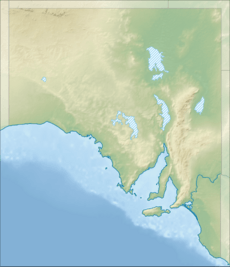Beatrice Islet Conservation Park facts for kids
Quick facts for kids Beatrice Islet Conservation ParkSouth Australia |
|
|---|---|
|
IUCN Category Ia (Strict Nature Reserve)
|
|
| Nearest town or city | Kingscote |
| Established | 16 March 1967 |
| Area | 1.03 km2 (0.4 sq mi) |
| Managing authorities | Department for Environment and Water |
| See also | Protected areas of South Australia |
The Beatrice Islet Conservation Park is a special protected area in South Australia. It includes the Beatrice Islets and the nearby intertidal areas. The intertidal zone is the part of the coast that is covered by water at high tide and exposed at low tide.
This park is located in Nepean Bay on Kangaroo Island. It's about 4 kilometers (2.5 miles) east of the town of Kingscote.
Contents
What is Beatrice Islet Conservation Park?
The Beatrice Islet Conservation Park is a place where nature is protected. It was officially created in 1967. Before that, it had other forms of protection since 1909. The main goal of the park is to protect the homes of wild animals.
Why is this park important?
The park is very important for waterbirds. It provides a safe place for them to find food and rest. This idea was set out in a plan for the park in 1987.
The park covers about 103 hectares (254 acres) of land. It is part of a sandspit that stretches from Cape Rouge. A sandspit is a narrow piece of land made of sand or gravel that sticks out into the water. This sandspit is just north of Kingscote.
Changes to the Islets
The Beatrice Islets used to have bushes of a plant called African boxthorn. This plant is not native to Australia. When these bushes were removed in the 1960s or 1970s, it caused problems. The land started to wear away, a process called erosion. This made the islets unstable.
Because of this, the islets changed a lot. They became more like a mudflat or a bed of cockles. These areas are covered by water when the tide is high.
How the park is protected
The Beatrice Islet Conservation Park is given a special protection level by the IUCN. It is a 'Category Ia protected area'. This means it is a very strict nature reserve. These areas are kept as wild as possible, with very little human disturbance. This helps to protect the plants and animals that live there.
 | John T. Biggers |
 | Thomas Blackshear |
 | Mark Bradford |
 | Beverly Buchanan |


